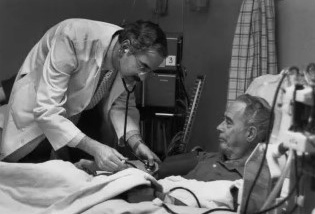 Our dialysis program, under the leadership of Dr. Mony Fraer, gives our fellows an in-depth exposure to the main modes of outpatient dialysis therapies, center and home (hemodialysis and peritoneal dialysis), enabling them to formulate realistic strategies to select the option most suited to their ESRD patients. Care for the ESRD patient involves a multidisciplinary team approach that includes the fellow, staff nephrologist, social worker, dietician, and nurses.
Our dialysis program, under the leadership of Dr. Mony Fraer, gives our fellows an in-depth exposure to the main modes of outpatient dialysis therapies, center and home (hemodialysis and peritoneal dialysis), enabling them to formulate realistic strategies to select the option most suited to their ESRD patients. Care for the ESRD patient involves a multidisciplinary team approach that includes the fellow, staff nephrologist, social worker, dietician, and nurses.
Center Dialysis
The fellow will be rotating through the outpatient dialysis unit at the University of Iowa Hospitals and Clinics during their B Consult blocks. Once weekly for 6 months they will rotate on one staff dialysis shift, with the shifts rotating every 6 months to provide the opportunity to work with different staff. This continuity of care allows the fellow to experience the day-to-day management of the ESRD patients on maintenance dialysis. The fellow will round once weekly with the staff while on the B service at a set time and will gradually assume independent responsibility in decision-making for these patients over the 2 year period. All facets of patient care will be covered, including monthly lab review, adjustments in dialysis prescriptions, dietary recommendations, evaluation of access problems and social issues.
Home Dialysis Program
We currently have about 30 patients on home therapies (hemodialysis or peritoneal dialysis) in our program (one of the longest-running in the country). Each patient is seen monthly in the clinic by the assigned staff and fellow. For those patients beginning training for home therapies, the fellow rounds once weekly with the staff and makes any necessary changes in the treatment plan.
Continuous Renal Replacement Therapies
Over the course of your training, the fellow will become familiar with all the modalities of continuous renal replacement therapy (CRRT), the role of hemoperfusion in the management of drug intoxications, and, with the use of ultrafiltration techniques for patients requiring this modality.